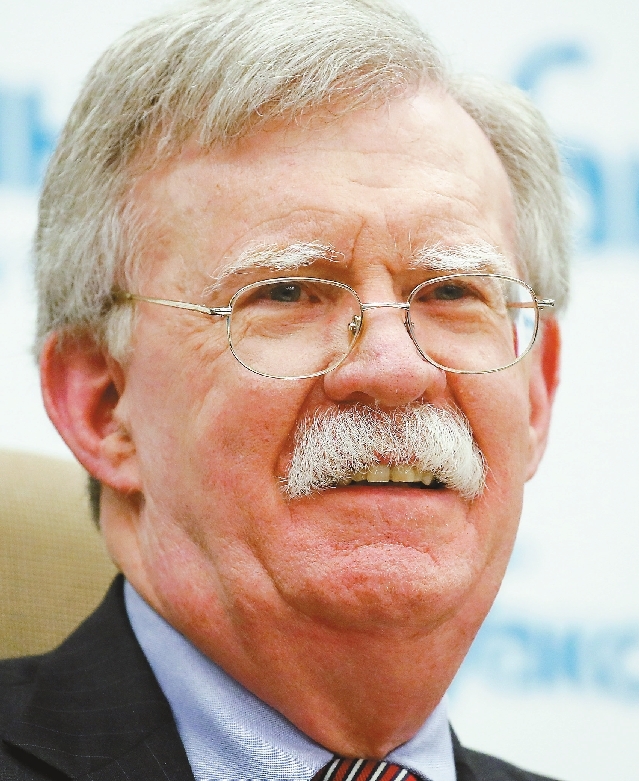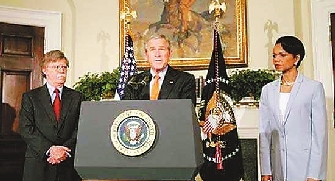

DONALD TRUMP stunned Washington once again Tuesday with a tweet saying he had fired John Bolton, his national security adviser who has pushed U.S. foreign policy to the right for decades. But just 20 minutes afterward, Bolton — a consummate insider despite his contempt for the establishment — hit back with his own tweet and text messages to reporters, already contradicting Trump by saying that he had quit on his own. A former under secretary of state and ambassador to the United Nations under former U.S. President George W. Bush, Bolton, 70, known for his trademark bushy mustache, was tapped as national security adviser in March 2018 after impressing Trump with his outspoken performances on Fox News. Bolton, who lasted 17 months at the helm of national security policy in Trump’s turbulent White House, has always been a Washington fighter, more willing than virtually any other senior U.S. official to deploy military force — and waging his battle deep within the bureaucracy. A longtime Republican hawk, Bolton spent much of his tenure trying to restrain the president from making what he considered unwise agreements with America’s enemies. Trump bristled at what he viewed as Bolton’s militant approach, to the point that he made barbed jokes in meetings about his adviser’s desire to get the United States into more wars. Their differences came to a climax in recent days as Bolton waged a last-minute campaign to stop the president from signing a peace agreement at Camp David with leaders of the radical Taliban group. He won the policy battle as Trump scrapped the deal but lost the larger war when the president grew angry about the way the matter played out. “I informed John Bolton last night that his services are no longer needed at the White House,” the president tweeted. “I disagreed strongly with many of his suggestions, as did others in the administration, and therefore I asked John for his resignation, which was given to me this morning. I thank John very much for his service.” An unapologetic campaigner for the Iraq invasion who at times advocated war against Iran and the Democratic People’s Republic of Korea, Bolton was so controversial that Bush had to bypass the Senate to appoint him ambassador to the United Nations. After leaving the Bush White House, Bolton relished his role as a media commentator, stridently denouncing Barack Obama and flirting with his own presidential run. He had seemed like a relic from an earlier time — until the television-loving Trump saw him on Fox News. The mogul-turned-president was impressed by the loquacious expert, although he reportedly was put off by one of Bolton’s signature traits — his bushy moustache. Bolton joined despite clear philosophical differences with Trump, who has frequently called for less U.S. involvement overseas. “He has strong views on things but that’s okay,” Trump said in May. “I actually temper John, which is pretty amazing.” Suzanne DiMaggio, a foreign policy scholar at the Carnegie Endowment for International Peace, said Bolton survived so long in part because he shattered the painstaking decision-making process, which Trump holds in contempt. “Bolton played an important role for Trump — he freed him from the bureaucratic constraints of a national security policy process by demolishing it,” she said. But Bolton’s differences with the rest of the Trump team had increasingly been out in the open. Bolton had been highly critical of talks with Afghanistan’s Taliban, so much so that The Washington Post reported that he was excluded from seeing a draft plan on pulling U.S. troops. He also would have furiously protested a summit with Iran, as mulled by Trump. Bolton has long been close to Iran’s militant exiled opposition, telling them at a rally shortly before he was appointed that they would go together to Tehran to celebrate regime change “before 2019.” And when Trump walked onto North Korean soil in June to see leader Kim Jong Un, Bolton — once branded “human scum” by Pyongyang for his hawkish stance — headed to Mongolia. Trump also grew disenchanted with Bolton over the failed effort to push out President Nicolas Maduro of Venezuela. Rather than the easy victory he was led to anticipate, Trump has found himself bogged down in a conflict over which he has less influence than he had assumed. Of all issues, Bolton has said he is proudest of his efforts under both Bush and Trump to disrupt the International Criminal Court, believing it could target Americans and violate U.S. sovereignty. In one of Bolton’s most memorable remarks, he dismissed the United Nations in a 1994 speech, quipping that if the 38-floor secretariat in New York “lost 10 stories, it wouldn’t make a bit of difference.” Bolton traces his views, including his fervent denunciations of what he sees as elitism within an internationalist-minded foreign policy establishment, to his working-class childhood in Baltimore. He recalls how his father, a firefighter, was told he could not register as a Republican in the heavily Democratic city. Bolton’s contempt for elites grew as he attended Yale University, where he was a rare conservative and supporter of the Vietnam War. Bolton, however, did not serve in the war, instead joining the National Guard. In his memoir, he voiced some regret but blamed his decision on liberals. “Dying for your country was one thing, but dying to gain territory that anti-war forces in Congress would simply return to the enemy seemed ludicrous to me,” he wrote. Describing his working-class upbringing to the right-wing news site Breitbart, Bolton said that he still followed lessons from his firefighter father. “My father used to always say: ‘Don’t start fights, but if you get in one finish them.” Long before Trump popularized his “America First” slogan, Bolton termed himself an “Americanist” who prioritized a cold-eyed view of national interests and sovereignty over what they both saw as a starry-eyed fixation on democracy-promotion and human rights. They shared a deep skepticism of globalism and multilateralism, a commonality that empowered Bolton to use his time in the White House to orchestrate the withdrawal of the United States from arms control treaties and other international agreements. Bolton, the hard-liner, saw his job as keeping Trump from going soft in what he considered fuzzy-headed diplomacy. But if Trump’s original national security team was seen as restraining a mercurial new commander in chief, the president found himself sometimes restraining Bolton. Behind the scenes, he joked about Bolton’s penchant for confrontation. “If it was up to John, we’d be in four wars now,” one senior official recalled the president saying. To Bolton’s aggravation, the president has continued to court Kim, despite Kim’s refusal to surrender his nuclear program and despite repeated short-range missile tests by North Korea. In recent days, Trump has also expressed a willingness to meet with President Hassan Rouhani of Iran under the right circumstances, and even to extend short-term financing to Tehran. Mike Pompeo confirmed Tuesday that it was possible such a meeting could take place this month on the sidelines of the United Nations General Assembly session in New York. Russia was another flash point for the two. While Trump seeks to woo President Vladimir Putin, Bolton considers Moscow a hostile player. After Trump last month suggested inviting Russia back into the Group of Seven despite its annexation of Crimea, Bolton traveled to Ukraine to reassure its leaders of American support against Russian aggression. Among others pleased to be rid of Bolton were Iran’s leaders, who viewed him as an enemy of peace. Hesameddin Ashena, Rouhani’s top political adviser, tweeted that Bolton getting sidelined was “a definitive sign that Washington’s maximum pressure on Iran has failed” and that “Iran’s blockade will end.”(SD-Agencies) | 
